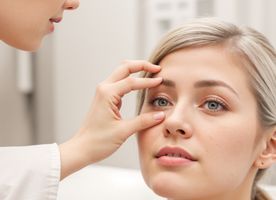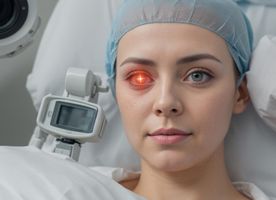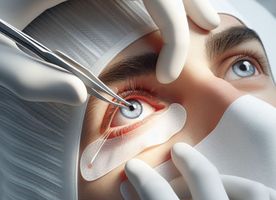Detached Retina Treatment in Av Soledade
Search and Compare the Best Clinics and Doctors at the Lowest Prices for Detached Retina Treatment in Av Soledade



































































































































































No Time?
Tell us what you're looking for and we'll reach out to the top clinics all at once
What does a Detached Retina Treatment Procedure Involve?
To start learning about detached retina treatment in Av Soledade, a detached retina is when the crucial, vision-performing layer inside your eye lifts off from its usual spot. It's pretty serious stuff and can lead to a permanent loss of sight if not treated swiftly.
Detached retina treatment comes in a few forms. The choice of treatment, which might involve the use of lasers, freezing (also known as cryopexy), or even more serious surgeries like pneumatic retinopexy, scleral buckle, or vitrectomy, depends entirely on your condition's specifics and severity.
On top of the risks, the recovery process also needs time and patience. After the procedure, you will have to follow the doctor-provided recovery instructions closely, take any prescribed medicines on time, give your eyes ample rest, and avoid any activity that could strain your eyes.
How Long Should I Stay in Av Soledade for a Detached Retina Treatment Procedure?
If you're planning to have detached retina treatment in Av Soledade, you'll want to know how long you need to stick around. Because we're all unique, it really does depend on your personal situation.
Typically, after the procedure, you might spend a couple of days in the hospital. However, it's a good idea to plan to stay in Av Soledade for about a week. This time will help you complete all the pre and post-treatment steps smoothly.
Keep in mind, this is a rough estimate. To get the right answer customized to your health, it's best to have a chat with your healthcare provider.
What's the Recovery Time for Detached Retina Treatment Procedures in Av Soledade?
Got your eyes fixed with a detached retina treatment in Av Soledade, now you're probably curious about how long it'll take before you're back to normal. Generally, it could be anywhere from 2 to 4 weeks.
Keep in mind that your body may have its own pace of healing. So, put your feet up, catch up on rest, and follow any exercises your doctor suggests. It's normal to experience fluctuations in your vision during this time, but it should get steadier in a few months.
If you're feeling uncertain or something feels off, don't hesitate - reach out to your healthcare provider without delay. They're equipped and ready to support you through this journey.
What sort of Aftercare is Required for Detached Retina Treatment Procedures in Av Soledade?
Getting over detached retina treatment in Av Soledade involves a lot more than just rest. Frequent eye check-ups should be on your to-do list for the first few days. Your eye doctor can keep an eye (pun intended) on the healing process and nip any troubles in the bud.
Post-treatment, you may be provided with some medications like eye drops or pain relief tabs. Make sure you follow the doc's instructions to the letter while taking these. And don't skip on any rehab exercises your doctor might suggest, they are crucial for strengthening your eye muscles and sharpen your vision.
Remember, you also have a part to play. You should get enough sleep, eat a balanced diet, avoid eye strain, and steer clear of any heavy or intensive activities. These simple self-care steps can go a long way in supporting your recovery.
What's the Success Rate of Detached Retina Treatment Procedures in Av Soledade?
If you're looking at the track record of detached retina treatment in Av Soledade, you'd be pleased to know that the success rate is pretty good. In many cases, it's a one-and-done deal. But remember, each case is its own story.
The outcome can hinge on how bad the detachment was, your overall health status, and how speedily you got medical attention. Although the surgical success rate is promising, it doesn't always mean that your vision will be completely restored to your pre-detachment level.
Discuss this in detail with your healthcare provider. They can give you the most accurate idea of the kind of results you can expect.
Are there Alternatives to Detached Retina Treatment Procedures in Av Soledade?
If we're talking about alternatives for detached retina treatment in Av Soledade, the options are limited. Retinal detachment is usually a medical emergency, requiring immediate surgery. The surgical options may differ (pneumatic retinopexy, vitrectomy, or scleral buckling), but all aim at the same outcome - reattaching your retina.
Certain preventive measures can be taken if you're at a high risk of retinal detachment. For instance, laser photocoagulation or cryopexy can be done to seal retinal tears before they lead to a full blindness. Keep in mind, these are preventive, not alternatives.
If you have concerns or questions about alternatives, it's best to discuss them with a healthcare provider. They can guide you the best in your unique situation.
This information has been accurately sourced and verified by a medical professional for its accuracy, however, we strongly recommend you to consult with your doctor before pursuing medical procedures overseas.







